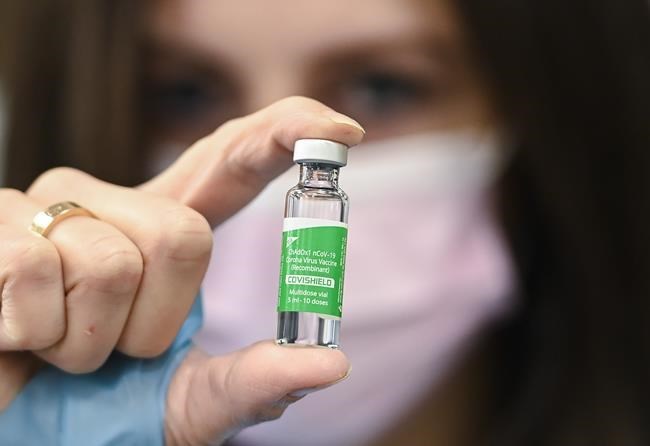FREDERICTON — New Brunswick health officials on Wednesday reported the province's first death of someone who developed a blood clot after receiving the Oxford-AstraZeneca vaccine.
The individual in their 60s received the vaccine in mid-April and developed symptoms a week later, chief medical officer of health Dr. Jennifer Russell told reporters Wednesday. She said the person, whose gender was not disclosed, was admitted to hospital and died two days later.
"I want to stress that medical complications following vaccination are extremely rare, but they do happen," Russell said.
The New Brunswick death is the third reported in Canada of someone dying after taking the AstraZeneca vaccine. The deaths are linked to a rare blood-clotting syndrome known as vaccine-induced thrombotic thrombocytopenia, or VITT.
A 54-year-old Quebec woman died last month after receiving the AstraZeneca vaccine, and Alberta officials announced on Tuesday night the death of a woman in her 50s who had received that shot.
Alberta's chief medical officer of health, Dr. Deena Hinshaw, said in a statement Tuesday that officials had identified two cases of VITT out of more than 253,000 doses of AstraZeneca administered in the province.
Russell said the risk of complications from the vaccine remains very low: between one in 100,000 and one in 250,000 doses. She added that hundreds of thousands of doses of the AstraZeneca vaccine have been administered across Canada, the vast majority of them without incident.
New Brunswick has so far received 48,000 doses of the AstraZeneca vaccine and administered 44,000 of them.
The province has reported two cases of VITT. Russell said there are two other suspected cases under investigation but wouldn't provide details until the investigations are complete.
"We will continue to evaluate the use of this vaccine to ensure that risks associated with its use are proportional to the potential consequences of contracting COVID-19," Russell said. "The risk is not zero using it in people 55 and over, but the information that we have to this date is that the benefits outweigh those risks."
Russell said anyone getting the vaccine should monitor for adverse symptoms, including shortness of breath, chest pain, leg swelling, persistent abdominal pain, neurological symptoms such as severe and worsening persistent headaches or blurred vision and skin bruising or tiny blood spots under the skin beyond the site of the injection.
Experts maintain the blood-clotting syndrome is exceedingly rare and treatable in most cases.
Health Minister Dorothy Shephard told the news conference that while the death is tragic, it's important to remember that the risks of dying from COVID-19 are far greater than those associated with receiving the AstraZeneca vaccine. She said the vaccine will continue to be provided to people 55 and older in New Brunswick.
"All of the vaccines that we're using are Health Canada approved," Shephard said, noting that 38 per cent of New Brunswickers over the age of 16 have now received at least one dose of vaccine.
Russell said her office expects to receive medical advice in two weeks about whether people who received a first dose of AstraZeneca should get a second dose of the same or receive another vaccine.
Meanwhile, health officials reported on Wednesday the province's 39th COVID-19-related death. Officials said a resident in their 70s of special-care home Pavillon Beau-Lieu in Grand Falls, N.B., died in hospital.
The province reported 11 new COVID-19 cases: five in the Edmundston region, three in the Moncton area, and one in each of the Saint John, Fredericton and Bathurst regions. New Brunswick has 145 active reported cases of COVID-19 and six patients in hospital wit the disease, including two in intensive care.
This report by The Canadian Press was first published May 5, 2021.
Kevin Bissett, The Canadian Press



